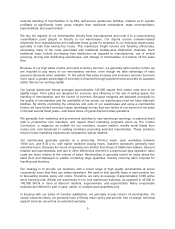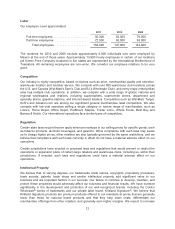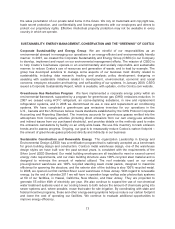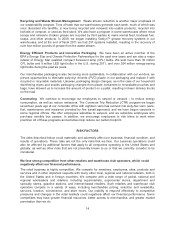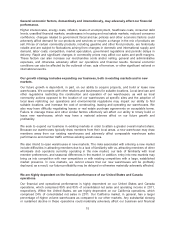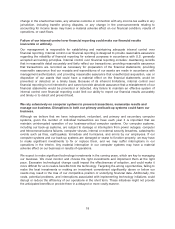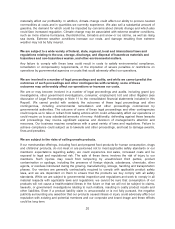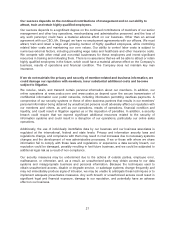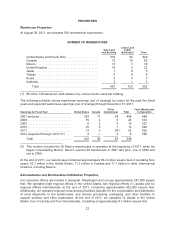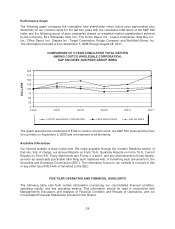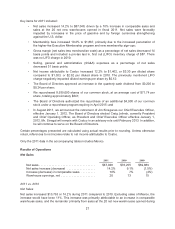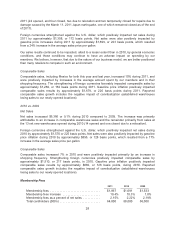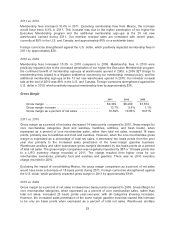Costco 2011 Annual Report Download - page 21
Download and view the complete annual report
Please find page 21 of the 2011 Costco annual report below. You can navigate through the pages in the report by either clicking on the pages listed below, or by using the keyword search tool below to find specific information within the annual report.Our international operations subject us to risks associated with the legislative, judicial,
accounting, regulatory, political and economic factors specific to the countries or regions in
which we operate, which could adversely affect our financial performance.
During 2011, our international operations, including Canada, generated 27% of our consolidated net
sales. We plan to continue expanding our international operations. As a result of these expansion
activities in countries outside the United States, we expect that our international operations could
account for a larger portion of our net sales in future years. Future operating results internationally
could be negatively affected by a variety of factors, many beyond our control and similar to those we
face in the United States. These factors include political conditions, economic conditions, regulatory
constraints, currency regulations and exchange rates, and other matters in any of the countries or
regions in which we operate, now or in the future. Other factors that may impact international
operations include foreign trade, monetary and fiscal policies both of the United States and of other
countries, laws and regulations of foreign governments and the United States (such as the Foreign
Corrupt Practices Act), agencies and similar organizations, and risks associated with having major
facilities located in countries which have been historically less stable than the United States. Risks
inherent in international operations also include, among others, the costs and difficulties of managing
international operations, adverse tax consequences and greater difficulty in enforcing intellectual
property rights. Additionally, foreign currency exchange rates and fluctuations may have an adverse
impact on our future costs or on future cash flows from our international operations.
Market expectations for our financial performance is high.
We believe that the price of our stock generally reflects high market expectations for our future
operating results. Any failure to meet or delay in meeting these expectations, including our comparable
warehouse sales growth rates, margins, earnings and earnings per share or new warehouse openings,
could cause the market price of our stock to decline, as could changes in our dividend or stock
repurchase policies.
Natural disasters or other catastrophic events could unfavorably affect our financial
performance.
Natural disasters, such as hurricanes or earthquakes, particularly in California or in Washington state,
where our centralized operating systems and administrative personnel are located, could unfavorably
affect our operations and financial performance. Such events could result in physical damage to one or
more of our properties, the temporary closure of one or more warehouses or depots, the temporary
lack of an adequate work force in a market, the temporary or long-term disruption in the supply of
products from some local and overseas suppliers, the temporary disruption in the transport of goods
from overseas, delays in the delivery of goods to our depots or warehouses within a country in which
we operate and the temporary reduction in the availability of products in our warehouses. Public health
issues, such as a potential H1N1 flu (swine flu) pandemic, whether occurring in the United States or
abroad, could disrupt our operations, disrupt the operations of suppliers or customers, or have an
adverse impact on consumer spending and confidence levels. We may be required to suspend
operations in some or all of our locations, which could have a material adverse effect on our business,
financial condition, and results of operations. These events could also reduce demand for our products
or make it difficult or impossible to receive products from suppliers.
Factors associated with climate change could adversely affect our business.
We use natural gas, diesel fuel, gasoline, and electricity in our distribution and warehouse operations.
Increased government regulations to limit carbon dioxide and other greenhouse gas emissions may
result in increased compliance costs and legislation or regulation affecting energy inputs could
19


